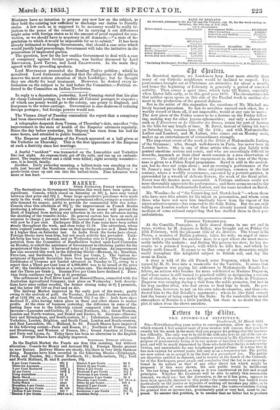1fl4t trttrto.
In theatrical matters, we Londoners keep Lent more strictly than many of our Catholic neighbours would be inclined to suspect. Tho pantomimes brought out at Christmas are attractive for about a month, and hence the beginning of February is generally a period of renewed activity. Then comes a quiet time, which lasts till Easter, especially when Easter falls early, as in this good year 1853. The circumstance too that neither opera opens on this side of the Paschal week is another ele- ment in the production of the general dulness.
But in the midst of this stagnation the exertions of Mr. Mitchell are lively beyond precedent. So fast do novelties succeed each other, tha a weekly record of them all, if not impossible, would at any rate be useles The new piece of the Friday ceases to be a feature on the Friday follow ing, making way for other joyous ephemerides ; and only a chosen few such as L'Etourneau or Le Chevalier des Dames, retain the post of honour in the bills for any length of time. M. Ravel, instead of taking his leave on Saturday last, remains here till the 19th; and with Mademoiselles Luther and Lambert, and M. Lafont, who comes out on Monday next, makes up an entertainment of extraordinary strength.
The important event of the week is the debflt of Mademoiselle Luther, of the Gymnase ; who, though well-known in Paris, has never been in London before. She is one of those artists who can play lightly with genteel emotions serious and comic, and who are exceedingly difficult to describe, inasmuch as their chief merit consists in a nice observation of manners. The chief effect of her engagement is, that a tone of the Gym- nese is given to a Niels Royal programme. Ravel is still in the ascend- ant, but he does not reign alone ; and an evening's performance at the St. James's may be likened to those oil-paintings, common in the last century, where a worldly countenance, executed by a portrait-painter, is surrounded by a wreath of delicate flowers, the work of the floral artist. Never was the theatre more successful. A Parisian audience could not more thoroughly appreciate the performance ; and there seems no end to the smiles bestowed on Mademoiselle Luther, and the roars lavished on Ravel.
























 Previous page
Previous page